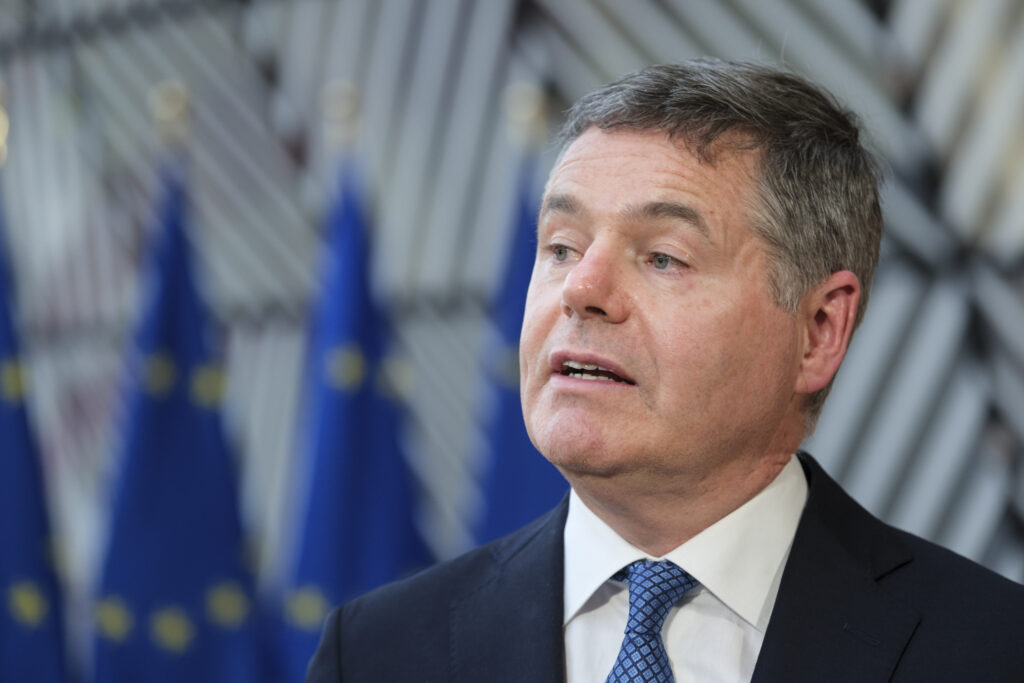BRUSSELS — The European Central Bank has proposed handing EU capitals more power over the design of a digital version of the euro, opening a path to a deal on the controversial project after a year of deadlock.
The concession, yet to be signed off, would allow member countries to have the final say on the maximum amount of digital euros consumers can hold in their digital wallets at any one time — answering a key concern of some countries as well as the banking sector.
Finance ministers will discuss the proposal this week at a meeting in Copenhagen, where they could informally accept it, according to several officials familiar with the negotiations. The proposal is “likely to pass,” said one diplomat.
The Frankfurt-based ECB wants to get its plan for a purely digital version of the euro signed off as soon as possible, fearing a major delay will mean it loses ground to U.S.-based private sector payment systems — particularly dollar-denominated “stablecoin” cryptocurrencies that have become a popular cross-border payment method.
But EU member countries have clashed with the ECB over who should have the final decision-making power on the digital euro’s design.
This week there was a breakthrough, according to officials.
In a last-minute move, the European Commission presented national government officials with a new ECB pitch on how to decide the maximum amount of digital euros that can be held in digital wallets.
Governments have asked to have the final say on the matter since 2024, worrying that if the limit is too high it could prompt consumers to withdraw too many digital euros at once from their banks to store in digital wallets — in much the same way they can currently withdraw physical cash from ATM machines. They fear that could lead to a run on banks and threaten financial stability.
The new proposal offers a compromise: It says the ECB will start a consultation with governments two years before the issuance of the digital euro, and will propose an overall limit one year before the issuance. This will need the support of a reinforced qualified majority among eurozone governments — the strongest possible majority used in EU voting procedures.

The same reinforced majority will be necessary to make any subsequent changes to the ceiling proposed by the ECB. That means giving governments more weight in the decision process.
The Council aims to get a formal compromise on the whole digital euro regulation by the end of the year. However, the rules also need to be approved by the European Parliament, which is unlikely to happen until next year, meaning the launch of the digital euro could still be several years away.
End of a long battle
The concessions could mark the end of over a year of disagreement between the ECB and national capitals, led by Germany and France.
One diplomat complained the ECB’s technocratic culture clashed with the political jostling of Brussels, making it difficult to reach an agreement. “These people have big power but not political skills,” he said of the ECB, in comments made before the new proposal was put forward. The ECB declined to comment.
Another diplomat, who like others quoted in this article was granted anonymity to talk about closed-door meetings, said there would be “broad support” as long as the latest proposed tweaks are made.
When the clash began, governments were told it would be legally impossible to grant their request. One year later, that no longer appears to be the case.
“That was what we asked one year ago,” said one of the diplomats. “That proves that even the legal services are political.”
The central bank made a first big concession toward governments in July. Just a few days before a gathering of finance ministers, it presented a proposal in a high-level official meeting to give them the last word on the matter. But finance ministers didn’t back the pitch.
Eurogroup President Paschal Donohoe said at the time “the very fact that our colleagues in the Commission and the ECB and my own team were able to come forward with a proposal represented great progress.”
Other officials reported a huge rift.
The earlier proposal, seen by POLITICO, gave governments three months, potentially extended to six, to decide on the limit and the chance for a qualified majority to veto it. In case of no decision, the ECB could go ahead and set the limit and issue the digital euro.
The last pitch, again presented just one week before a ministers’ meeting, doesn’t change the silence-approval mechanism in case of no decision by governments, but in exchange sets a clearer and longer timeline, requires more countries to agree on the limit, and also addresses doubts raised by countries such as Germany and Austria on what will happen after the launch.





